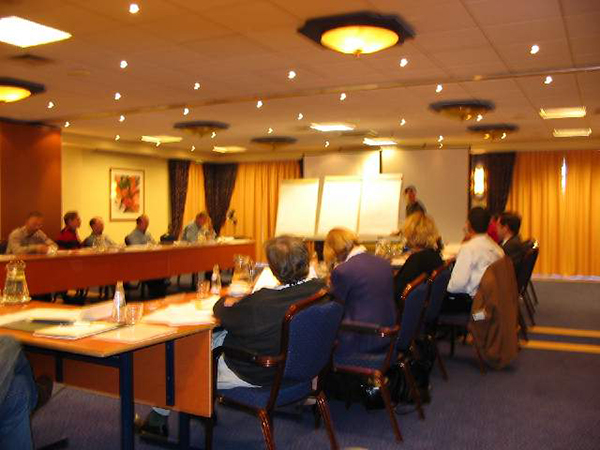Trial design in adult idiopathic inflammatory myopathies, with the exception of inclusion body myositis
- Number 119
- Date 10 October 2003
20 Participants from Belgium, Czech Republic, France, Germany, Italy, The Netherlands, Spain, Sweden, UK, and USA met in Naarden (The Netherlands) from 10-12 October, 2003. The group comprised neurologists and rheumatologists involved with research into the treatment of the idiopathic inflammatory myopathies, as well as experts in statistics and clinical trial design.
Improvements in the treatment of patients with polymyositis (PM) or dermatomyositis (DM) are hampered by difficulties in the design of randomized controlled trials (RCTs) and the low incidence and prevalence of patients. Therefore the aims of this workshop were twofold. The first was to make progress towards reaching consensus on main issues in the design of RCTs for PM/DM, notably diagnostic criteria, outcome measures, definitions of relapse and treatment failure, and trial duration. This was addressed by first reviewing and discussing the design and conduct of completed and ongoing RCTs in PM/DM, and pinpointing specific difficulties. Subsequently, we discussed proposals concerning each of these issues. It was agreed that diagnostic criteria should allow the exclusion of other diseases and also should allow a diagnosis based on the underlying pathogenesis, while at the same time these criteria should be broadly applicable in pragmatic clinical trials. Agreement was reached on major aspects of the proposed diagnostic criteria. With respect to outcome measures, we discussed the ongoing studies by the International Myositis Assessment and Clinical Study group (IMACS). We agreed on the specification of several of the IMACS core set measures and of several other relevant outcome endpoints.
The second aim was to explore the possibilities of international RCTs for PM/DM. It was emphasized that different efforts can be undertaken by specific networks (e.g., validation of outcome measures), and that the results can be made easily available to other networks or individuals through ENMC. Several organizational aspects were discussed. One session was dedicated to potentially immunosuppressive and immunomodulating therapies in myositis,including new drugs. Participants were invited to collaborate in two European RCTs which are currently running or about to start.
This was an enjoyable and fruitful workshop that will lead to new collaborations and will contribute significantly to the improvement of therapeutic RCTs for myositis in both Europe and North America.
An extended report of this meeting is published in Neuromuscular Disorders, Volume 14, No. 5, May 2004.
Dr. J.E. Hoogendijk, The Netherlands
Dr. A.A. Amato, U.S.A.
Dr. B.R.F. Lecky, United Kingdom

ENMC
Lt. generaal van Heutszlaan 6
3743 JN BAARN
The Netherlands
+ 31- 35-5480481
enmc@enmc.org
